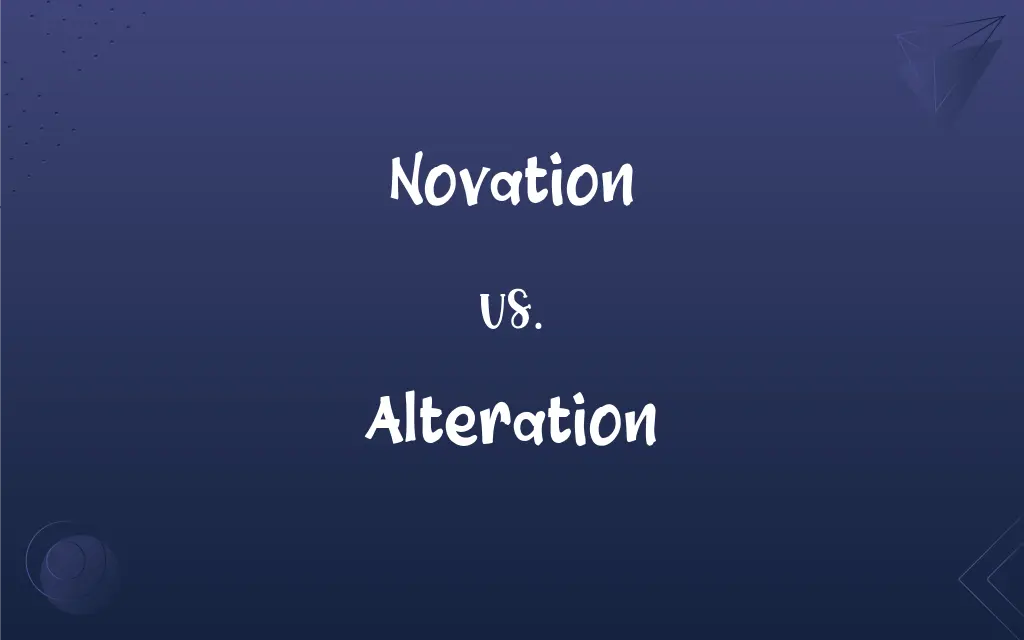Novation vs. Alteration: What's the Difference?
By Janet White || Published on November 30, 2023
Novation is the replacement of an old contract with a new one, involving a new party or term, while alteration is a modification within the terms of an existing contract.

Key Differences
Novation involves the substitution of a new contract for an old one, with new terms or parties being introduced. It effectively ends the old agreement and replaces it with a new one. For instance, if a borrower transfers their loan to another person, and the lender agrees, this constitutes a novation. Alteration, on the other hand, means making changes or amendments within the existing framework of a contract without replacing it. This might involve adjusting terms like payment schedules or delivery dates.
In novation, all parties involved must consent to the replacement of the old agreement. This process creates a new contractual relationship and extinguishes the original contract. For example, in a business sale, novation can transfer the seller's contracts to the buyer. Alteration is generally simpler, requiring the agreement of the parties to modify specific terms of the current contract, such as changing the scope of work in a service agreement.
The key aspect of novation is the creation of a new legal entity or obligation, replacing the old one. It's often used when the performance of the original contract becomes impossible or impractical. Alteration, however, does not create a new contract but adjusts the existing one to suit changing circumstances, like extending a project's deadline.
Novation can be necessary when the parties involved in a contract change, or when the terms of the contract need a complete overhaul. It's a more fundamental change than alteration, as it replaces the entire contract. In contrast, alteration typically involves smaller adjustments, such as minor changes in contract clauses, without affecting the contract's overall nature or purpose.
The legal consequences of novation include the discharge of the original contract and the creation of a new one. It requires a clear intention to replace the old agreement. Alteration keeps the original contract intact, with only specific terms being modified. The original contractual obligations largely remain in force, albeit with the agreed-upon changes.
ADVERTISEMENT
Comparison Chart
Nature
Replacement of old contract with a new one
Modification of terms within an existing contract
Requirement
Consent of all parties for a new contract
Agreement of parties for specific changes
Outcome
Creates a new legal entity or obligation
Adjusts existing terms without creating a new contract
Use
When parties or fundamental terms change
For minor adjustments or updates
Legal Effect
Discharge of old contract, creation of new one
Original contract remains with modified terms
ADVERTISEMENT
Novation and Alteration Definitions
Novation
Replacing an existing contract with a new one.
The loan's novation involved transferring the debt to a new borrower.
Alteration
Making changes within an existing contract.
The alteration of the contract extended the completion deadline.
Novation
Creating a new contractual obligation, replacing the old.
Novation occurred when the original contractor was replaced.
Alteration
Adjusting clauses or conditions in a current agreement.
Alteration of the lease included a pet policy.
Novation
Substituting a new party or new terms in a contract.
The novation of the lease agreement included a new tenant.
Alteration
Modifying specific terms without creating a new contract.
The contract's alteration changed the payment schedule.
Novation
Discharging an old contract by forming a new one.
The supplier agreement underwent novation to include different delivery terms.
Alteration
Changing certain elements while maintaining the original contract.
The alteration modified the project's specifications.
Novation
A legal mechanism to change parties in an agreement.
Novation was used to transfer the service contract to the acquiring company.
Alteration
Amending the scope or obligations within a contract.
The alteration added new service requirements.
Novation
The substitution of a new contract for a previous contract, or the substitution of a new party for a previous party in a contract, so that the previous obligation is considered discharged or the previous obligor released.
Alteration
The act or procedure of altering.
Novation
(legal) Replacement of a contract with one or more new contracts, in particular in financial markets the replacement of a contract between a particular buyer and seller with contracts between the clearing house and each party.
Alteration
The condition resulting from altering; modification.
Novation
(legal) A new contract between the original contracting parties whereby the first obligation is extinguished and a new obligation is substituted.
An example of a novation is where an original debt which was payable in two instalments is novated to become payable in five installments.
Alteration
The act of altering or making different.
Novation
Innovation.
I shall easily grant that novations in religion are a main cause of distempers in commonwealths.
Alteration
The state of being altered; a change made in the form or nature of a thing; a changed condition.
Novation
A substitution of a new debt for an old one; also, the remodeling of an old obligation; debt restructuring.
Alteration
The act of altering or making different.
Alteration, though it be from worse to better, hath in it incoveniences.
Novation
(law) the replacement of one obligation by another by mutual agreement of both parties; usually the replacement of one of the original parties to a contract with the consent of the remaining party
Alteration
The state of being altered; a change made in the form or nature of a thing; changed condition.
Ere long might perceiveStrange alteration in me.
Appius Claudius admitted to the senate the sons of those who had been slaves; by which, and succeeding alterations, that council degenerated into a most corrupt.
Alteration
An event that occurs when something passes from one state or phase to another;
The change was intended to increase sales
This storm is certainly a change for the worse
The neighborhood had undergone few modifications since his last visit years ago
Alteration
The act of making something different (as e.g. the size of a garment)
Alteration
The act of revising or altering (involving reconsideration and modification);
It would require a drastic revision of his opinion
FAQs
Does novation require mutual consent?
Yes, novation requires the agreement of all parties involved in the original and new contract.
When is novation used?
Novation is used when there's a need to change the parties involved or fundamentally revise the terms of a contract.
What does alteration mean in a contract?
Alteration in a contract means modifying specific terms or conditions within the existing agreement.
Does alteration affect the validity of the original contract?
Alteration does not affect the overall validity of the original contract; it only modifies certain terms.
Is a written agreement necessary for alteration?
While not always legally required, a written agreement is advisable for clarity and proof of alteration.
What is novation in contract law?
Novation in contract law is the process of replacing an old contract with a new one.
What is an example of contract alteration?
An example of contract alteration is changing the delivery dates in a supply agreement.
Is novation common in business contracts?
Novation is relatively common in business, especially in mergers, acquisitions, and changes in service providers.
What are the legal effects of novation?
The legal effects of novation include the termination of the original contract and the commencement of a new one.
How does alteration differ from amendment?
Alteration and amendment are similar, but alterations often refer to more minor or specific changes.
Can alteration lead to contract termination?
Significant alterations, if not agreed upon, can lead to disputes and potentially contract termination.
Can alteration be done unilaterally?
Alteration typically requires the agreement of all parties involved in the contract.
How is consent expressed in contract alteration?
Consent in contract alteration is typically expressed through a formal agreement or addendum.
Is alteration common in rental agreements?
Alteration is common in rental agreements, especially for terms like rent amounts or lease durations.
Who benefits from novation?
Novation can benefit all parties by clearly defining new terms and obligations suited to current needs.
Can novation be implied?
Novation usually requires clear, explicit consent and cannot typically be implied.
What happens to the original contract after novation?
The original contract is terminated and replaced by the new contract after novation.
Are there risks in contract alteration?
Risks in contract alteration include misunderstandings or disputes over the nature and impact of changes.
What is the difference between novation and assignment?
Novation replaces an entire contract, while assignment transfers only certain rights or obligations under a contract.
Can novation occur in employment contracts?
Yes, novation can occur in employment contracts, especially when companies are acquired or merged.
About Author
Written by
Janet WhiteJanet White has been an esteemed writer and blogger for Difference Wiki. Holding a Master's degree in Science and Medical Journalism from the prestigious Boston University, she has consistently demonstrated her expertise and passion for her field. When she's not immersed in her work, Janet relishes her time exercising, delving into a good book, and cherishing moments with friends and family.






































































